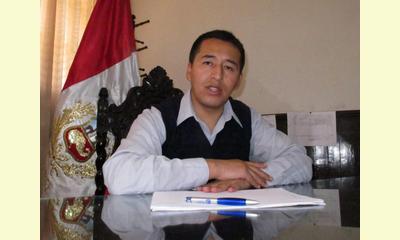|
|
Peace Commissioner Announces a Dialogue to Stop Conflicts [Peru]
un article par Jorge Alberto, Diario Correo, Peru
The Commissioner for Peace and Development of Ayacucho, Daniel Roca Sulca, said he will seek dialogue between organizations in the areas where there are a number of conflicts, after sharing information with the Ombudsman's Office of Ayacucho.

The Commissioner for Peace and Development of Ayacucho, Daniel Roca Sulca. Foto: EPENSA
click on photo to enlarge
According to the records of the Ombudsman there are currently recorded 13 conflicts within the region of which 9 are active, and 4 latent. Reports also show that the conflicts are also shared with the regions of Ica, Huancavelica and Arequipa, which remain areas of high conflict.
"We are aware of a number of conflicts within the region and other regions, and we believe that first of all we need to establish a dialogue with all of the various organizations in order to maintain the culture of peace," said the official.
According to Roca Sulca, one strategy is to initiate discussions and sharing of information with grassroots organizations and institutions that are involved.
The official also said it expects active participation from the platforms of the Roundtable for Poverty Reduction (MCLCP), the Government, mothers' clubs and other grassroots organizations to prevent and reduce the numbers of conflict.
"We expect greater involvement of the negotiating table, the government, and other organizations to maintain the culture of peace. This is a task that also includes local governments," concluded the official.
(Click here for a Spanish version of this article)
|








|
DISCUSSION
Question(s) liée(s) à cet article:
The culture of peace at a regional level, Does it have advantages compared to a city level?
* * * * *
Commentaire le plus récent:
CPNN has often carried articles about establishing a culture of peace at the level of the city, but there are also some advantages to promoting a culture of peace at a somewhat broader regional level.
In particular, the culture of peace needs to be based on a sustainable economy, which, in the long run, should depend on local agricultural production more than imported food. This requires that the unit for the culture of peace include not only the city, but also the agricultural region surrounding it.

|
|









